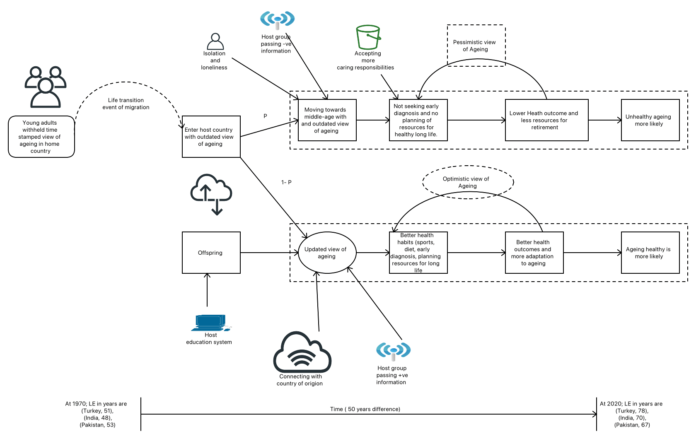In a recent article by MENARAH core member Mohamed Ismail, the impact of social contacts on the adoption of health innovations among older individuals from diverse cultural backgrounds was discussed. The study shed light on the outdated and often pessimistic views on ageing prevalent among older migrants in Europe compared to the general population—the research aimed to uncover the role of innovation diffusion as a contributing factor to this phenomenon.
The Role of Social Contacts:
Drawing from the diffusion of innovation theory, the study explored how information is accessed, exchanged, and communicated through social contacts. The research utilised a mixed methods approach, employing a mathematical diffusion model to examine the differential effects of innovation diffusion based on social contact rates among migrant groups compared to the UK population.
Understanding the Context:
Since direct information on social contact rates among migrants in the UK was unavailable, the study used equivalence from migrants’ home countries as proxies. Social matrices of contact data were derived from publicly available information and surveys conducted in three countries with substantial migrant populations in the UK and Europe: India, Pakistan, and Turkey.
Implications for Policy and Inclusive Healthcare:
The analysis revealed that, after accounting for other factors, migrants are likely to experience significant delays in adopting health innovations compared to the majority UK population. These findings hold crucial policy implications for promoting inclusive public health interventions, particularly in the context of an increasingly diverse older population in the UK.
Addressing Health Inequalities:
The study emphasised the importance of understanding the factors influencing healthy ageing among ethnic minority groups, given the existing literature on health determinants and inequities among these populations. The research highlighted the need to consider ageing perceptions and expectations within different communities and the implications of adopting healthy ageing behaviours.
Reducing Health Inequalities in Old Age:
By recognising the risk factors associated with outdated views of ageing among earlier cohorts of migrants in Europe, innovative approaches can be developed to reduce health inequalities in old age. The study emphasised the significance of individual and community-held views about ageing, which can inform interventions to support younger cohorts of migrants in adopting healthier habits and planning for later stages of life.
Cultural Specificity and Sustainable Healthcare:
Culturally specific public health interventions are necessary to increase the uptake of health innovations. Targeting younger cohorts of migrants, specifically those under 30, will likely yield significant long-term results in adopting healthy ageing behaviours. These findings are relevant not only to the UK but also resonate with the experiences of older people in the MENA region, presenting potential application opportunities.
The Challenge of Rapid Ageing Transition:
The global increase in life expectancy has led to a rapid ageing transition, posing challenges for individuals who still primarily relate to the experiences of their parents and grandparents. Outdated views on ageing, combined with migration trajectories and structural inequalities, may hinder the uptake of health education and preventative measures among older migrants, potentially leading to social isolation and reduced access to health innovations.
Reflections:
The study’s findings align closely with the goals and objectives of the MENARAH Network, which seeks to effectively address the demands resulting from population ageing while enhancing the dignity, health, and quality of life of older people. By connecting researchers, policymakers, older people and their informal carers, educators, and practitioners and raising public awareness, the network aims to build capacity and foster collaboration.
The study’s focus on understanding the effects of social contacts on the uptake of health innovations among older migrants directly contributes to the research objectives of the MENARAH Network. The network aims to generate knowledge that can be translated into policies and practices by conducting much-needed research on the region’s ageing and long-term care needs.
The findings highlight the importance of producing actionable knowledge to inform tangible policy and practice improvements to enhance the quality of life and well-being of older people and their families. By identifying the challenges faced by older migrants and recognising the impact of outdated views on ageing, the study provides valuable insights for developing targeted interventions and inclusive public health strategies.
Moreover, the emphasis on culturally specific public health interventions aligns with the network’s objective of promoting equitable and person-centred care. Recognising the diverse backgrounds and experiences of older migrants, the study underscores the need to tailor interventions to address their unique needs, beliefs, and expectations.
Understanding the differential effects of social contacts on health innovation uptake among different groups of older people is essential for planning inclusive and sustainable healthcare systems. Public health interventions can be developed by addressing outdated views of ageing and considering the specific needs of diverse populations to bridge the gap and promote healthier ageing for all individuals, irrespective of their cultural background or migration experience.
In summary, the study’s findings reinforce the goals and objectives of the MENARAH Network by contributing to the knowledge base on ageing, informing policy and practice improvements, and advocating for inclusive approaches that prioritise the dignity, health, and well-being of older people. By bridging research, policy, and practice, the network can leverage these findings to promote positive change and enhance the lives of older individuals and their families in the MENA region.
Ismail, M. The Effect of Social Contacts on the Uptake of Health Innovations among Older Ethnic Minorities in the UK: A Mixed Methods Study. Sustainability 2023, 15, 10839. https://doi.org/10.3390/su151410839
Director of Analytical Research Ltd, and Affiliate Research Fellow, Oxford Institute of Population Ageing, University of Oxford, United Kingdom
Mohamed is trained in engineering (MEng – Cairo University), computer science (MSc – Cairo University) and mathematical finance (MSc – CASS Business School, University of London). Mohamed started his career in in the City of London in 1990s, working as a quantitative analyst for leading global financial organisations, such as Merrill Lynch, HSBC, Mizuho and Credit Suisse, before he began to shift his focus onto quantitative social research. Since 2009, he has worked as an independent researcher in the field of social sciences with a particular drive to make use of different statistical and mathematical modelling techniques for the analysis of large and multi-dispersed data sets.
He has worked with universities in the UK, Europe, Australia and the Middle East; publishing a number of peer-reviewed articles. He has also been invited to give talks and presentations at several leading universities and organisations. His current research interests focus on exploring the potential role of mathematical dynamical systems in the field of population ageing across health and social care. Mohamed is the Director of Analytical Research ltd and an affiliate at the Oxford Institute of Population Ageing, University of Oxford.



